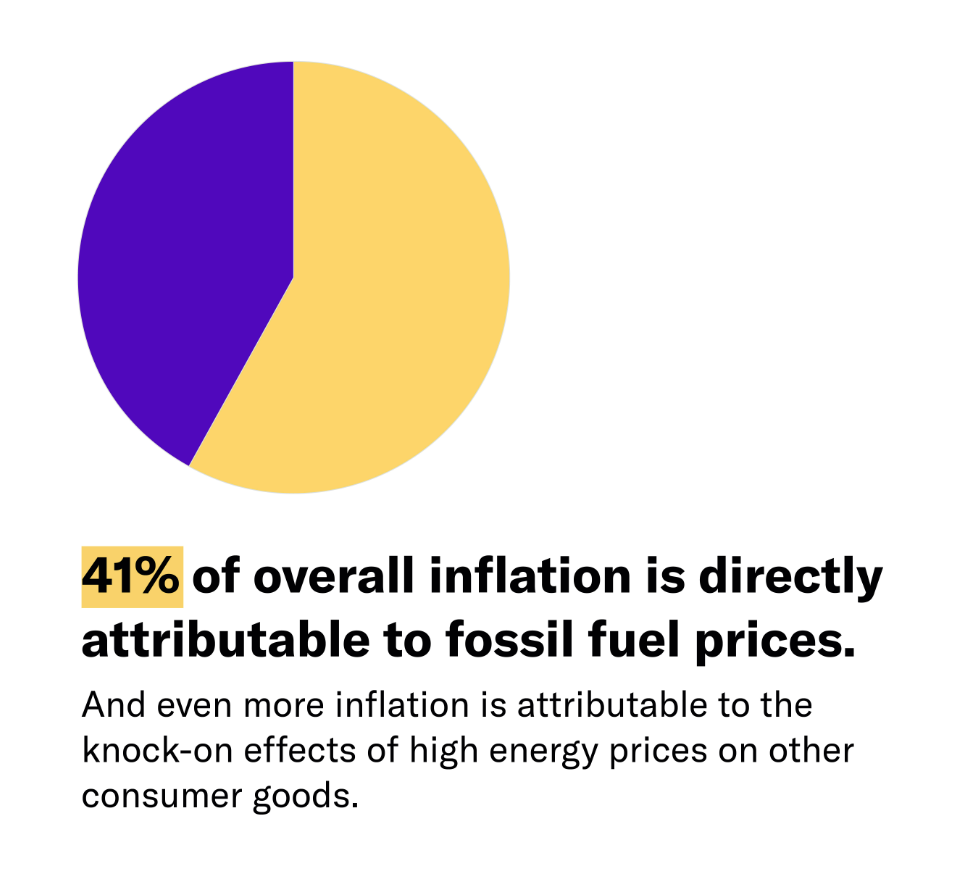Clean energy investments are the antidote to inflation
A household savings memo from Rewiring America
By Noah Goldmann, Sam Calisch, Leah Stokes, Rachael Grace, Ari Matusiak
-
Congressional energy investments will empower American families to electrify their homes and save money on their energy bills, all while combating inflation, foreign energy dependence and climate change.
-
Since Putin’s invasion of Ukraine, 41 percent of overall inflation is directly attributable to skyrocketing fossil fuel prices. Investments in electrification will free American households from spiraling fossil fuel costs and pump the brakes on inflation.
-
If households had electrified a year ago under Congress’s potential energy provisions, they would have saved $970 in energy bills, and $1,350 if they had also installed solar panels. If current prices hold over the next year, these savings will grow to $1,420 and $1,840, respectively.
-
Congressional action will reduce the three billion barrels of oil required each year for household heating and transportation. Each avoided barrel of oil bolsters American energy security and insulates us from the whims of tyrants abroad.

Top 10 Reasons Why Electrification Fights Inflation
1. Fossil Fuels are Driving Inflation
Since Putin’s invasion of Ukraine, 41 percent of overall inflation is directly attributable to skyrocketing fossil fuel prices—and even more inflation is attributable to the secondary effects of high energy prices on other consumer goods.
2. Investments in electrification will free American households from skyrocketing fossil
If households had electrified a year ago under Congress’ proposed energy provisions, they would have saved $970 in energy bills, and $1,350 if they had also installed solar panels. If Congress acts now, these savings will start flowing to American households right away.
3. Efficient, Electric Machines = Better Performance, Lower Costs
Electric appliances are 3-5x more efficient than their fossil fuel counterparts, which translates to consumer savings.
4. Billions in Savings for All American Families
103 million American families would save money every month on their energy bills from electrifying just their furnaces and water heaters. Total savings would be $37 billion per year.
5. No Household Left Behind
45.6 million low- and moderate-income households would save $17 billion annually from electrifying just their furnaces and water heaters, with average savings of approximately $400 per year.

6. Good American Jobs
Electrification will create over 450,000 local installation jobs that cannot be automated or offshored, in addition to creating 80,000 to 100,000 manufacturing jobs and 800,000 indirect and induced jobs.
7. Breaking the Foreign Dependency
Fossil fuel dependency ties American energy needs to petrostate autocrats. Over the course of a year, the United States uses three billion barrels of oil for home heating and transportation. Breaking our reliance on fossil fuels would break the exploitative cycle between the global fuel market and the tyrants who control global oil supplies.
8. Affordable Electrified Solutions
Clean energy provisions being considered by Congress — including point-of-sale rebates, tax credits and flexible low-cost financing — represent a significant market opportunity for consumers who have been priced out of the current market for fossil fuel reliant appliances.
9. Cleaner Homes = Healthier Families
Fossil fuel machines also leak harmful toxins into the air at all times - even when they’re off - including carcinogens like formaldehyde and benzene. By removing indoor stationary sources of direct fossil fuel combustion, electric technologies mitigate harmful indoor pollutants. A gas stove in the home is the equivalent to living with a smoker.
10. Investing in Tomorrow
42 percent of U.S. energy usage can be traced back to decisions made by households “at the kitchen table.” In addition to providing economic savings, electrification will reduce emissions and keep our nation on track for its climate goals and standards.

